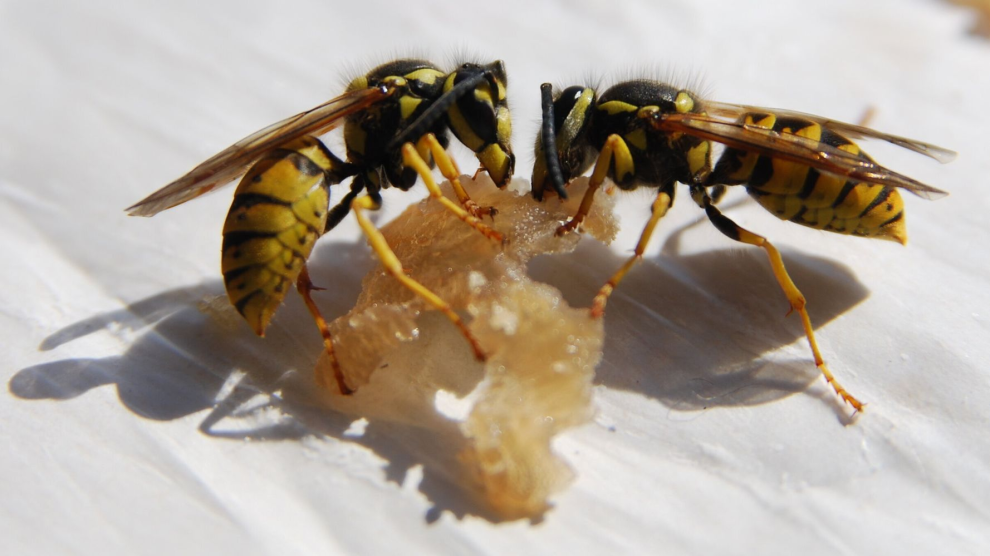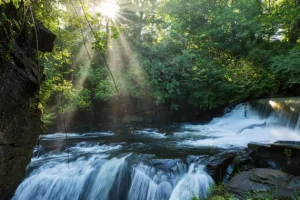AS summer progresses, you may have noticed a change in the behaviour of wasps, those familiar yellow and black insects that quietly went about their business pollinating plants in the first half of the season. However, get ready for them to become a lot more annoying. They are about to shift their focus from protein to sugary treats, and that means they could become quite a nuisance at your picnics and outdoor gatherings.
According to Seirian Sumner, a professor of behavioral ecology at UCL, wasps usually don’t bother humans or our sugary snacks during much of the summer. She explained, “Despite appearances, wasps only tend to upset your outdoor life at the end of the summer. There is, in fact, plenty of wasp action throughout the summer, but you are not interesting enough for them to bother with at that time.”
During mid-summer, wasps are more focused on hunting for protein to feed their baby siblings back at the colony. As sterile workers in a superorganismal machine, their evolutionary drive is to pass on their genes by raising siblings. So, while you enjoyed your prosecco luncheons and BBQ beers, the hard-working mid-summer wasps were busy hunting insects like caterpillars or flies to feed the colony’s thousands of baby siblings. In return for their hard work, the larvae provided them with carbohydrate-rich sugary secretions, which served as the main mode of nutrition for adult worker wasps.
However, as the larvae develop into wasps themselves, the amount of sugar they produce decreases. This leaves these sugar-addicted wasps in search of alternative sources of sweet treats. Professor Sumner explained, “Now they look for sugar away from the colony, often at your picnics. In the absence of those easy sugary feasts, they visit flowers: pollinating, just like bees.”
So, your picnic becomes a novel distraction for these wasps, attracting them with the sweet offerings on display. To keep them away, it’s best not to leave sugary products out in the open. Additionally, some plants, such as lemongrass, basil, and geraniums, produce scents that repel wasps due to their dislike for citronella oil.
Despite their reputation as pests, wasps play a vital role in our ecosystems. They are essential pollinators, just like bees, and contribute significantly to pollinating crops and plants. As pollinators of all kinds are facing struggles, preserving wasps’ natural habitats and appreciating their ecological importance are crucial steps in maintaining a balanced ecosystem. So, the next time you encounter a wasp at your picnic, remember that they too have their place in nature’s intricate web.
How to deal with wasps: Expert tips to stay safe and wasp-free
- Stay Calm and Avoid Swatting When a wasp decides to join your outdoor activities, it’s essential to remain calm and avoid the instinctive reaction of swatting at it. According to pest expert, John Murphy, flapping your arms can excite or enrage the wasp, increasing the risk of getting stung. Instead, he advises, “The best thing to do is to stay as still and calm as possible.”
- Dress Wisely to Deter Wasps Wearing the right clothing can make a difference in attracting or repelling wasps. Murphy recommends avoiding bright colours, as wasps are drawn to vibrant hues. Opt for light and pale colours such as white, tan, cream, or grey, which are considered “safe” colours. On the other hand, it’s better to avoid yellow, orange, or red, as they may be perceived as a threat by wasps.
- Utilize Citronella Candles Citronella candles provide a simple and effective way to keep wasps at bay without resorting to harmful chemicals. The candles release a fresh and distinctive odor that repels not only wasps but also bees, flies, and other insects. Placing citronella candles or tealights around your garden can create a protective barrier against unwelcome visitors.
- Cover Your Food to Deter Wasps When enjoying outdoor meals, take precautions to prevent wasps from being attracted to the smell of food. Murphy recommends covering your food with Tupperware boxes or mesh cloths. Whether you’re on a picnic or dining at a table, this simple step can significantly reduce the chances of wasps swarming around your meal.
- Grow Strong-Smelling Plants as Natural Repellents Transform your garden into a wasp-repelling zone by cultivating strong-smelling plants like fresh mint, ground coffee, cloves, and tomato stems. These aromatic plants not only enhance your garden’s appeal but also naturally repel wasps due to their powerful odours.
- Use Peppermint Oil Spray For those without fragrant plants at hand, peppermint oil can serve as an effective wasp deterrent. Create a DIY repellent by mixing a tablespoon of peppermint oil with four cups of water in a spray bottle. Before sitting down for your outdoor meal, spray the solution around your dining area to drive wasps away without resorting to harmful chemicals or fatal measures.
- Seek Professional Help for Wasp Nests Dealing with a wasp’s nest can be dangerous without the proper equipment and training. John Murphy advises against attempting to remove a wasp’s nest on your own, as it can lead to multiple stings and potential hazards. Instead, he suggests seeking professional help to handle the situation safely and effectively.















